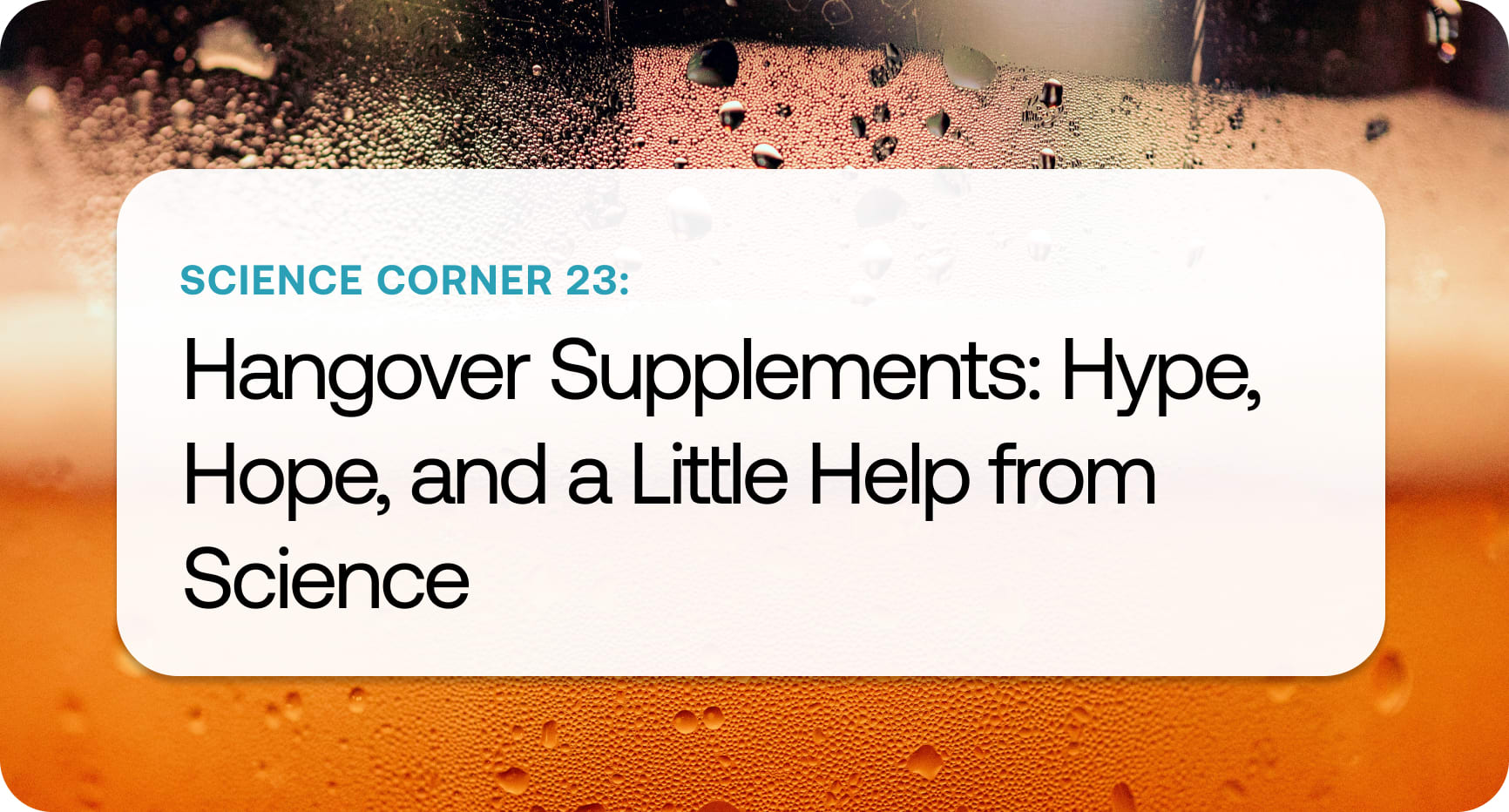Science Corner 23 | Hangover Supplements: Hype, Hope, and a Little Help from Science

If you have ever woken up after a night out feeling like your brain is wrapped in wool and your body is running on fumes, you have experienced the unpleasant physiology of a hangover. While water, rest, and time remain the most reliable remedies, the supplement aisle offers a range of options marketed for pre- and post-drinking recovery.
Let us explore some of the most common hangover supplements, why they might help, and what the science really says.
1. N-Acetylcysteine (NAC)
Why it might work: NAC is a precursor to glutathione, one of the body’s most important antioxidants. Alcohol metabolism produces acetaldehyde, a toxic compound that depletes glutathione and contributes to hangover symptoms. In theory, NAC taken before drinking could help replenish glutathione and speed acetaldehyde clearance.
Science check: While human studies exist, they are limited, but the biochemical rationale is strong, and NAC is well-studied for liver protection in other contexts (like acetaminophen overdose).
Typical dose: 600–1,200 mg before drinking.
2. Probiotic Enzymes (like Bacillus subtilis)
Why it might work: Some engineered probiotics can help break down acetaldehyde in the gut before it enters circulation. This could, in theory, reduce the severity of hangovers by targeting the problem at its source.
Science check: A 2021 study found that B. subtilis supplementation after alcohol exposure reduced liver injury and preserved gut health in mice. However, the research is still in its early stages, focused on biomarkers rather than actual symptom relief. Most importantly, it has not been tested in humans, so while the findings are intriguing, there is no evidence yet that it actually works.
Typical dose: Follows product label, typically taken 30–60 minutes before drinking.
3. Glycine
Why it might work: Glycine is a simple amino acid with calming and liver-protective properties. It may help reduce inflammation, improve sleep quality, and support detox pathways after alcohol consumption.
Science check: Animal studies suggest glycine supplementation can reduce oxidative stress in alcohol-exposed livers, but human data on hangovers is scarce.
Typical dose: 3–5 grams before bed.
4. Electrolytes
Why it might work: Alcohol is a diuretic, leading to fluid and electrolyte loss. Replenishing sodium, potassium, and magnesium can help restore hydration and support nerve and muscle function.
Science check: The scientific benefits are more about counteracting dehydration than curing hangovers. Electrolytes do not directly address acetaldehyde or inflammation, but they can help reduce fatigue and headache severity.
Typical dose: One serving mixed with water during or after drinking.
5. B-Complex Vitamins
Why it might work: Alcohol can impair absorption and increase excretion of B vitamins, which are essential for energy production and liver enzyme function. Supplementation may help offset these losses.
Science check: While B vitamins are important for metabolic recovery, there is little direct evidence that they reduce hangover symptoms in healthy adults. Still, restoring depleted nutrients is reasonable.
Typical dose: One full B-complex before bed or the morning after.
Bonus: Prickly Pear Extract
Why it might work: Prickly pear (Opuntia ficus-indica) is rich in antioxidants and anti-inflammatory compounds. Alcohol consumption triggers an immune response that contributes to hangover symptoms, and prickly pear’s bioactives may help blunt that inflammation.
Science check: A 2004 randomized controlled trial found that participants who took prickly pear extract five hours before drinking had reduced nausea, dry mouth, and appetite loss the next day. The effects were modest, but the study suggested immune modulation might be part of the benefit.
Typical dose: Around 1,600 mg of extract before drinking, based on the trial.
The Verdict
Hangover supplements can target specific aspects of alcohol’s toll on the body, oxidative stress, nutrient depletion, dehydration, but no single pill or powder can erase the effects entirely… yet.
The best approach is still moderation, hydration, and adequate sleep. That said, if you want to stack the odds in your favor, a thoughtful combination of NAC, probiotics, glycine, electrolytes, B vitamins, and perhaps prickly pear might make the next morning a little less brutal.
--
Personal note from Jordan
I have always been fascinated by how our bodies try to protect us from ourselves. The fact that the liver works overtime to neutralize the aftermath of a night out is a quiet miracle. Personally, I like the idea of giving it some backup. Do I think hangover supplements are a free pass to overindulge? Absolutely not. But if a couple of targeted nutrients can help you greet the morning with a little less regret, that is worth knowing. And, if you are like me, the older you get, the more you realize that even “just two drinks” can feel like five the next day. Science can help, but let’s be real… pacing yourself is still the ultimate biohack.
Citations from this article
Coppersmith, Veronica, et al. "The use of N-acetylcysteine in the prevention of hangover: a randomized trial." Scientific reports 11.1 (2021). Link.
Zhao, Meiqi, et al. "Dietary Bacillus subtilis supplementation alleviates alcohol-induced liver injury by maintaining intestinal integrity and gut microbiota homeostasis in mice." Experimental and Therapeutic Medicine 22.5 (2021). Link.
Mackus, Marlou, et al. "Alcohol hangover versus dehydration revisited: The effect of drinking water to prevent or alleviate the alcohol hangover." Alcohol 121 (2024). Link.
Wiese, Jeff, et al. "Effect of Opuntia ficus indica on symptoms of the alcohol hangover." Archives of internal medicine 164.12 (2004). Link.
